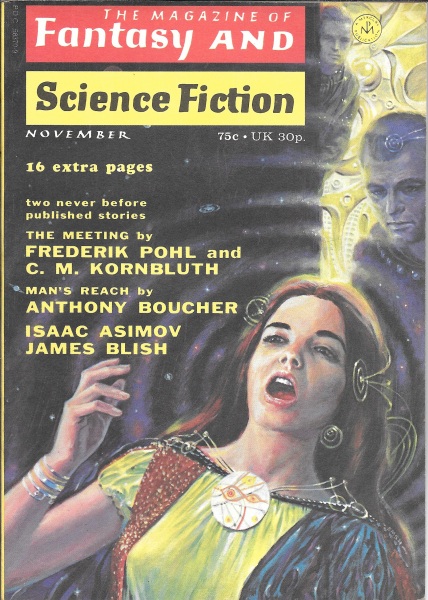
First appeared in Edward L. Ferman's F&SF. It won a Hugo and was up for the Locus. Reprinted by Lester del Rey, Terry Carr, Isaac Asimov, Fred D. Miller, Jr. and Nicholas D. Smith. Selected by James Frenkel as one Pohl's best.
Summary:
Harry Vladek attends meetings about "Exception Children" to seek advice from professionals about what to do to help his child. He and his wife are faced with a difficult decision about what to do with their child who lacked normal developmental progress.
Discussion and Analysis with Minor Spoilers:
Most readers will need to read this two or more times. Part of this is that the story doesn't reveal what's at stake until the end. The other part is that it is carefully written.
James Frenkel writes that this story:
"is a a thoughtful, challenging story about a modern dilemma with no easy answers."
Context:
About a century ago, relatives in our own family had a couple of children with learning disabilities. They traveled across the country to various "experts" who claimed they could help their kids. Without success. They hired private tutors who struggled in a manner that made the parents let the tutor go.
This would be some of the difficulties parents were facing a century ago and, to some degree, when this story was written.
In 1964, Congress passed Economic Opportunity Act of 1964, which included Head Start program. In 1975, Congress passed the IDEA or the Individuals With Disabilities Education Act. Moreover, Roe v. Wade is making its way to the Supreme Court. The year this story won the Hugo, Roe V. Wade became an important if controversial ruling that lasted five decades.
Within these barriers, this story exists, and for my money, it's a powerful glimpse into the challenges parents might have had in this extrapolation. Who knows? It might still lie ahead.
This has uncanny parallels to Kazuo Ishiguro's Never Let Me Go, but the narrator here doesn't direct us toward feeling a certain way toward the decision, facing our protagonists (although the decision and perspective here is firmly in the parents' point of view). Of course, the lack of compelling the reader toward any perspective neither necessarily makes it a better story nor does it necessitate that the readers have no perspectives of their own. Moreover, a reader does not have to side with an author, but there is power in this story for not taking a side. Perhaps it helps to step into the protagonists' shoes.
Some extrapolation may be required, but the story has relevance for today. Even if it hadn't, place within context, it should remain a powerful tale worth reading.

No comments:
Post a Comment